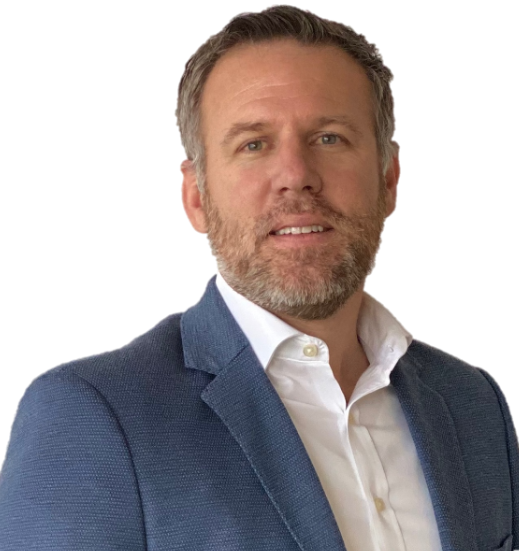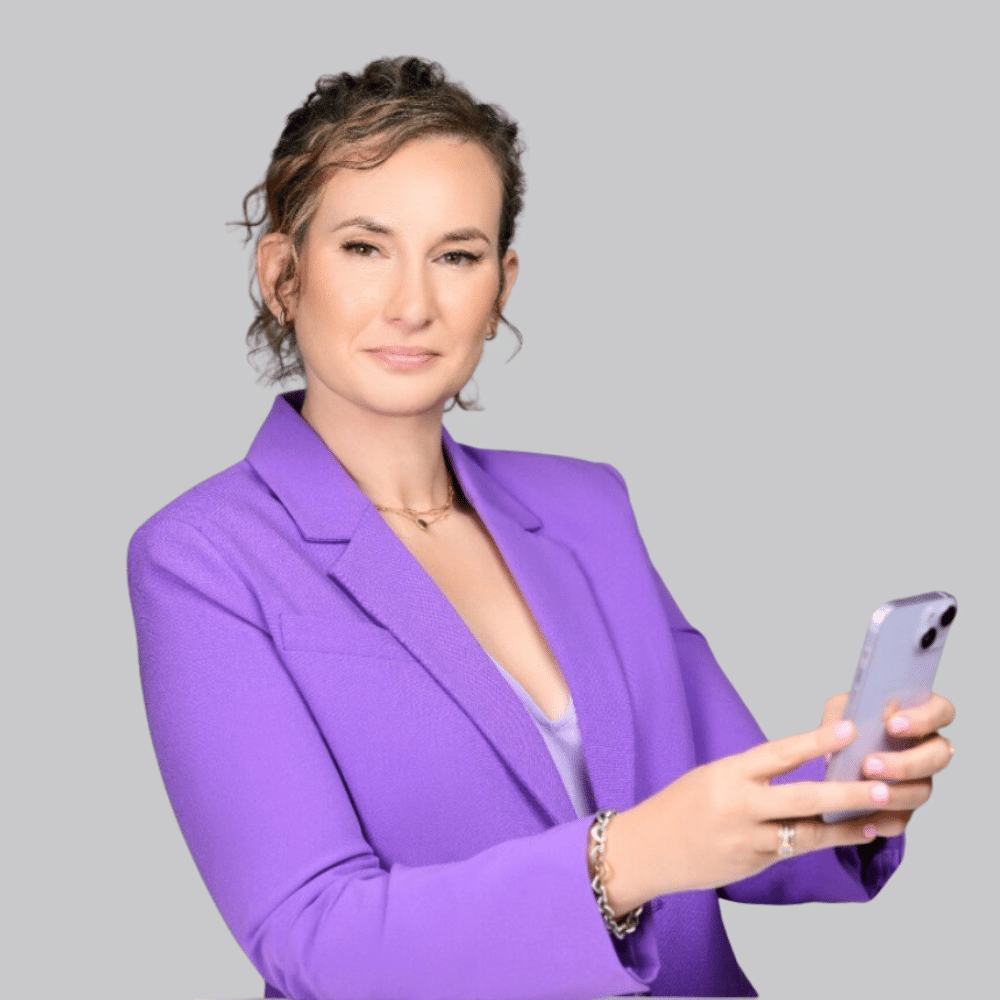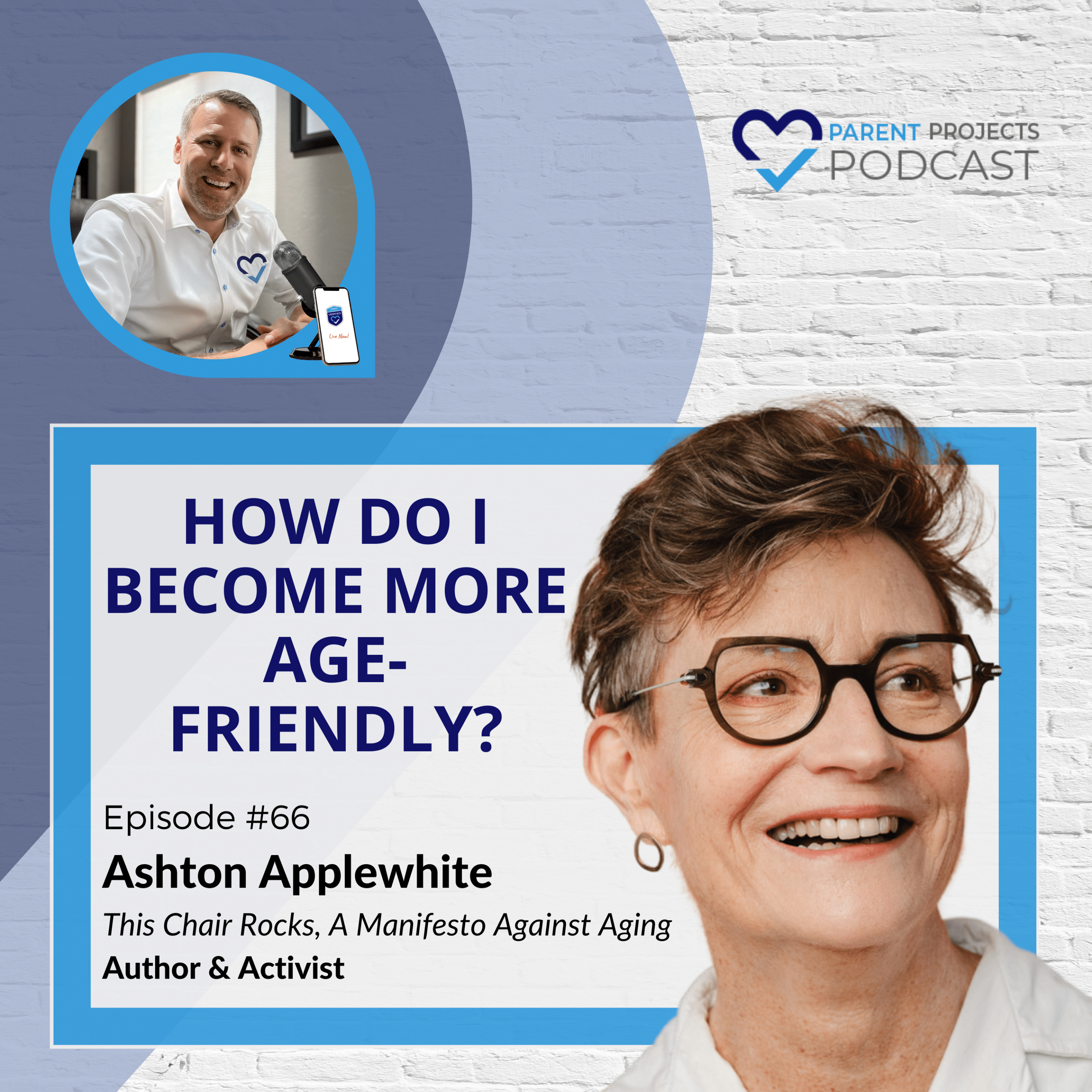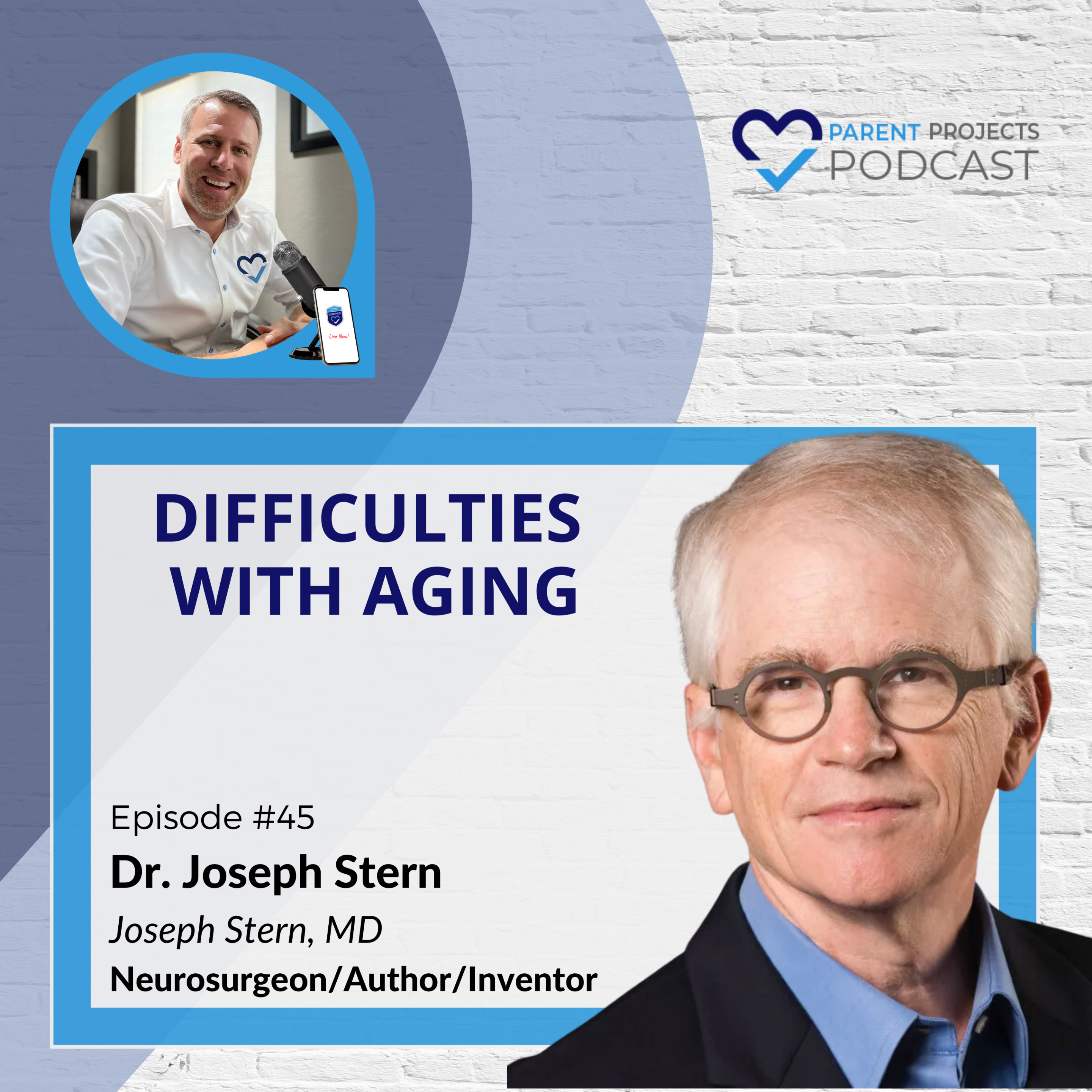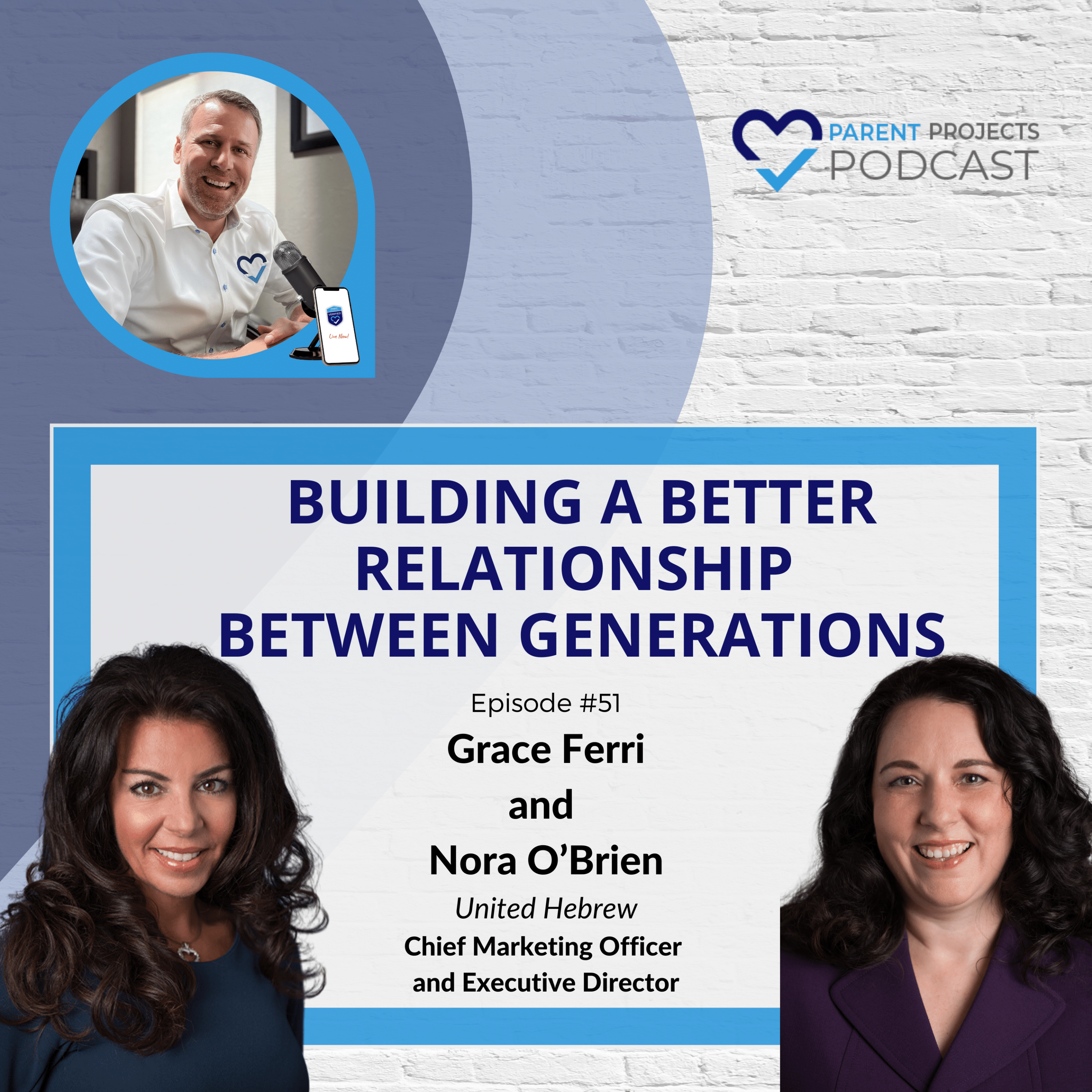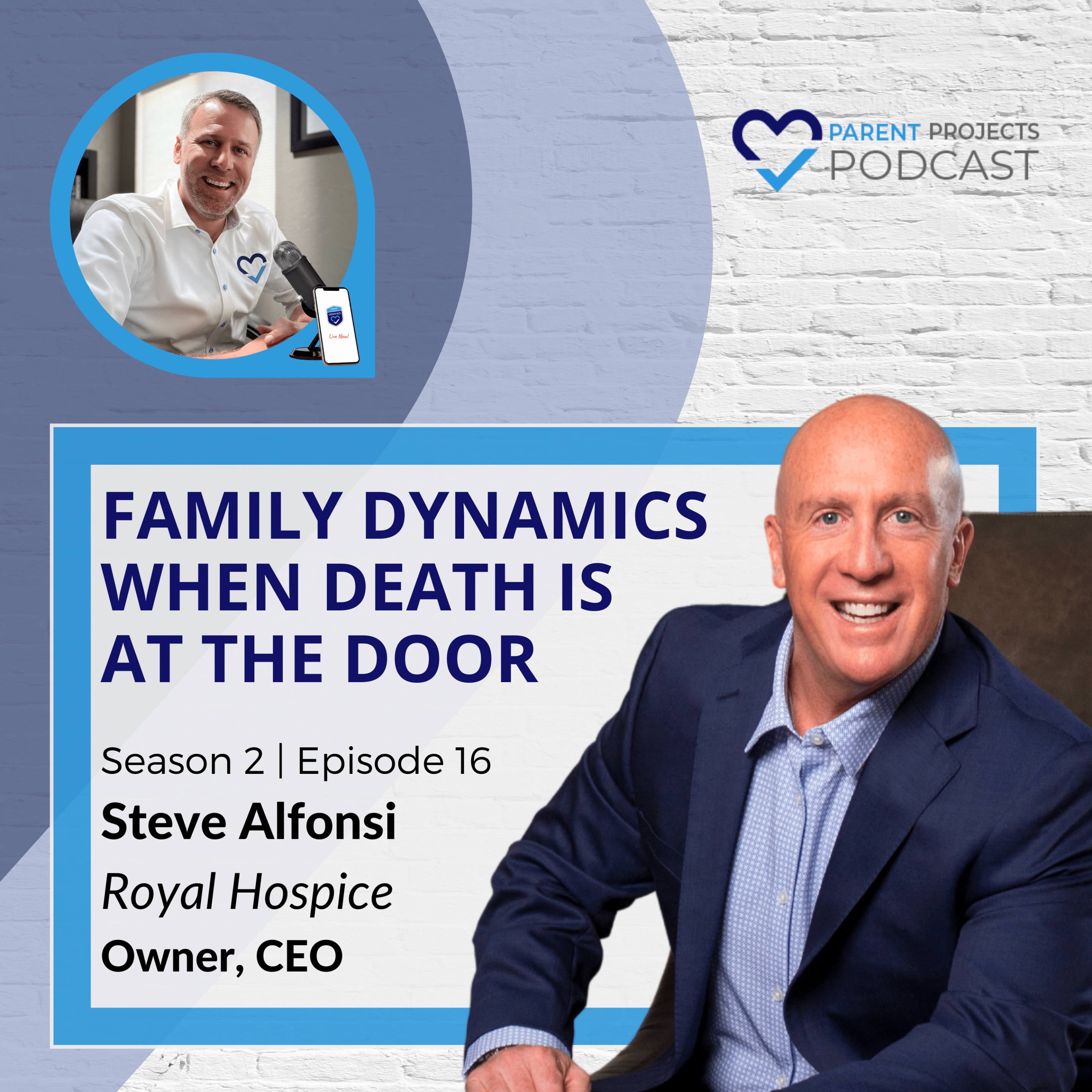Episode Transcript
[00:00:00] Speaker A: We are being ageist. Anytime we make an assumption about someone on the basis of how old we think they are, mostly too old because air quotes around that, because we live in such a youth obsessed society, but too young also, young people experience a lot of ageism. It's any judgment. So the earlier in life you can say, whoa, this is biased. These are ready made ideas that don't serve me well. The earlier in life, you can look at that and become what I call an old person in training, a phrase I appropriated from a geriatrician named Joanne Lynn, the better.
[00:00:45] Speaker B: Well, it's a manifesto against ageism. That's what Ashton Applewhite, our author and activist that's joining us today in the parent project studio, is going to talk to us about. And we're going to bring that into conversation about the power of words when we're talking with our loved ones and we're helping all of us age together in a way ahead. Ashton, thank you so much for joining us in studio.
[00:01:06] Speaker A: My pleasure. I like the way you said we age together because everyone wakes up a.
[00:01:11] Speaker B: Day that I believe that is absolutely true.
[00:01:16] Speaker A: It's not just something sad that old people are doing. Right?
[00:01:20] Speaker B: Well, look, success for any of us is everybody crossing the line together? I don't know. None of us wake up and think, you can tackle this without everybody finding peace at the end. So it's also, I've heard you talk several times with a great tongue in cheek humor to it. Actually, it's not even tongue in cheek. It's just great humor to it. It is a shared instate and there's an element of that. Tell me, look, I think I really want to dive in against that death. And death is scary. Death is scary for a lot of different reasons. Death sits at the ends of what we think we know, or we at least talk about a lot of aging. It's aging and then death, and we forget that aging happens to all of us. How is it not only that, talk to us about the manifest. Talk to us about how you want to tackle this.
[00:02:11] Speaker A: Well, death is scary. One of the many things I didn't know when I started this project was that the longer people live, the less they fear dying.
There are always exceptions, but by and large, people, they don't want to die. They don't want to die in pain, but they stop worrying about it because we become able to live more in the present and to appreciate the opportunities of the day because we're aware that time is short. Right. It doesn't fill us with dread.
And certainly part of our cultural reluctance to deal with aging has to do with fear of mortality, because older people, we have less road ahead of us than behind, that's for sure. However, in an ageist world, we conflate aging and dying. Dying is a discrete biological event that happens at the end of all this living. People may look at me and think I'm ancient, but they don't think I'm dying. So I think we have to be careful not to say, ooh, too scary. Don't want to think about the whole thing and separate out. We do need to address end of life issues. We do need to acknowledge that we're mortal. And acknowledging that we're aging is a pretty basic step there. I'm not saying there's no relation, but I really don't like it when people bundle it all up into something super scary that we can't think about, because we are aging from the minute we are born and we are only dying at the very end of that road.
[00:03:43] Speaker B: I think it's a good perspective. In that perspective, commercialism kind of comes against and uses a lot of fear in order to get us to move on these things. And you're challenging that. So when you do that, you're an activist from that. Talk to us about that. What does that mean? What does it mean to be an activist against ageism and your manifesto against ageism, what do you want to draw off of that, and how did you get to there?
[00:04:13] Speaker A: Well, that's a lot of questions.
I have a friend who did a project about women climate activists in her neighborhood, in her area. And I said, I have a perfect title for you, because every single person she talked to, and I think it's a little bit gendered. Women are a little less willing sometimes to state their accomplishments, but maybe that's changing. And every woman she talked to said, I'm not an activist, but I helped this law get passed. I cleaned up that sidewalk, whatever it was.
If you shift a tiny bit the way you think about age and aging, if you spend 10 seconds thinking about, gee, maybe it's not all about dying, and I need to reframe that. If you challenge conventional attitudes towards age and aging in any way, just between your ears, you are contributing to culture change. Because when we think differently about something, we go out in the world differently. We've all known that. We've all been dressed to the nines, and nobody's looked twice, and we've gone out on our sweatpants and heads have turned right. It's how we carry ourselves and how we learn things.
I am a full time activist. If the world were full of full time activists, it would be intolerable because everyone would be arguing with each other all the time or whatever, scrambling for the microphone. But I don't want people to think of it as a full time or arduous thing.
If you want to be less afraid of aging, learn about aging, right? Because the more we learn, the less scary it is, because so much of what we think we know is wrong or way off base. And carry that knowledge out in your interactions, in your conversations, or just in a dialogue in your own head, think about how you think about age and aging. When a thought about age pops into your head, stop for a second, and like, wow, did I just blame a pain? My knee. Ow. On being old. Well, does your other knee hurt? It's just as old if you say, oh, I'm too old for too young for that. There's no such thing, right? Other people that same age can do that thing, don't want to do that thing, couldn't do that thing when they were younger. Interrogate how you think about old, because, sorry, this is a really long answer, but it's a crucial point.
[00:06:40] Speaker B: I give you multiple questions. This is fair.
[00:06:42] Speaker A: Almost all bias is unconscious, and we can't challenge bias unless we're aware of it. And these are new ideas to most people. So just stop and think about how you think about age and aging. It'll pop up. Friends dating someone, how old are they? We all want ask that question. Why do we need to know? Why is it so important? That's what I mean. You can't get it wrong. No judgment. But stopping to think about where your attitudes are, where they come from, and then the next step is like, whoa, why do I equate every ache and pain with my age? Why do I think that it's appropriate or inappropriate for someone to date someone older and younger? That's the next step, and I will tell you. If you had told me 15 years ago, I would be fascinated by aging. I would have said, ooh, why do I want to spend my time thinking about something sad and icky? And aging is how we move through life. It touches on every aspect of being human, on every domain of inquiry. It is more interesting all the time. So just think about it a tiny bit, and I guarantee you'll think differently. And you might end up as intrigued as I am.
[00:07:55] Speaker B: So you now have been able to communicate your message to millions of people. I know I've seen at least one or two different videos that are approaching or have gone over 2 million views off of that. I think one of the TED talks for sure is you've been introducing this, you've been talking on this for some time, you and I. First time I've heard you talk through this was maybe five or six years ago or so.
Your points continue to be relevant. They land well, is there a time in someone's life that you see they're more open to others, to hearing the message of the dangers of ageism and what you're saying, are you seeing anything like that? Any kind of patterns with success and where to land as we start systemically, really working through your calling into society.
[00:08:48] Speaker A: Today, I don't think there's a particular point at which people along the lifespan. I am co founded something called the old school anti Ageism Clearinghouse, which is a repository of all kinds of vetted free resources to educate yourself about ageism and what we can do about it. It so happens that my two colleagues are in their 30s.
They got the memo. Much younger than I got the memo. I got the memo. The memo being, gee, maybe I should think twice about my attitudes towards aging and where they come from.
Much younger than I did. We are being ageist. Anytime we make an assumption about someone on the basis of how old we think they are, mostly too old because air quotes around that, because we live in such a youth obsessed society, but too young also, young people experience a lot of ageism. It's any judgment. So the earlier in life you can say, whoa, this is bias. These are ready made ideas that don't serve me well. The earlier in life you can look at that and become what I call an old person in training, a phrase I appropriated from a geriatrician named Joanne Lynn, the better, because then you are less likely to get sucked into these toxic messages about how a wrinkle is the end of your life. Old people are boring. The years ahead are something to dread and fear.
[00:10:17] Speaker B: So that I love. We've got an audience, and our primary audience that joins us and follows is an audience that maybe this is a new message to. But what's not new is. And what they share in common is in front of them lies having to communicate into a parent. And I think I held back and didn't say aging parent off of that, a parent.
And they want to age with, right? It's a whole family, everybody aging into this problem together.
Words really matter. And this is one that does, I got to tell you. I mean, in the last six years of this venture, I have heard a lot of opinions on seniors, on the word seniors, and on aged and on aging, and on whatever it might say, the golden generation or generation using generational labels, right, from millennials to this or to that, there are so much that sits out there.
One thing that seems a good common string, as we started to try to resolve on stuff, was to understand the context in which we use. It might make sense in a particular venue, but not across the board, in all venues, never. Yeah.
[00:11:33] Speaker A: Every individual is different. Every parent child relation is different, every family is different, every culture is different. So there is never a one size fits all solution. I think I'm struck by your framing, and it is what you do. So I don't mean to attack you at all, but it is framed in the culture as aging into this problem. Right. Because when things are problematized, then people can sell us solutions to them. And if we lived in a communitarian society where we lived in community, where we could walk to be, wouldn't need to drive, wouldn't be isolated, wouldn't live in houses that are miles apart, et cetera, and where there were social supports and where people paid care, there was subsidized care for people of all ages so people could earn a living wage doing this really important work, and paid child care so that people who have children at home could have more free time to do what they wanted, look after their own lives in addition to caring. If we had these structural supports, it wouldn't be a problem. Aging is not inherently a problem. It is a natural, beautiful, powerful, fascinating process that unites all humans on earth.
[00:12:59] Speaker B: Yeah, but the world we live in doesn't have that approach. Okay, I love the utopian push you put out there.
[00:13:11] Speaker A: It's important to zoom out and see that there are structures out here that make it harder than it has to be. And instead of constantly like, oh my God, if only I were stronger or better or my mother didn't drive me nuts or I hadn't had quintuplets or whatever it is, I could be doing this perfectly. Not in this world, you couldn't be. And it's important to direct our anger and our efforts at the systems that impoverish us all rather than take the responsibility individually.
[00:13:38] Speaker B: No, and you don't even have to say that. So in fact, you feel no need to qualify. I very much value in one thing that I really pulled off of the statement that you had. There is utopian painting of where we could be or not, is that it really showed that the problem is not the problem. The problem that sits in front of us isn't that. And that's super important. Right. Whether you are my first life as a military officer and in solving a conflict or resolving through an issue off of that, obviously military is the last resort you want to go to. It's when all diplomacy fails. It's when everything else can't figure its way out. And unfortunately, people feel like they have to move into that direction. And you'll never meet anybody who wants to be out of a job more than somebody in the military from that. You just hope it doesn't have to come down to that. But when it does, because it's a real world, you need to understand that the problem is not the problem.
[00:14:32] Speaker A: We're dealing with a broken system.
[00:14:34] Speaker B: Exactly.
And a culmination, maybe, of many broken systems that had been built or fixed on top of another broken one, and it has no chance to come through. And where that goes, we need to.
[00:14:47] Speaker A: Keep pushing for systemic change.
[00:14:50] Speaker B: Yeah, no, I think that is super important. That can't go away. And so while you work through this and you're working now, I'm speaking into the audience as we're working through a problem. We have. A problem in front of us, in our shared string, is that we have an older family member who's struggling to get things done on themselves, needs us to push in. They need us to help in some way. One challenge that we want to make sure that we make clear is that the way in which we do that really matters. And it's not always the easiest way, and it's not always the first way that comes up. It's super quick for me to jump in and just do it, but I can't think of anybody. I want to come live my life, and I'm pretty sure my mom can't think of anybody. She wants to come in and live her.
[00:15:34] Speaker A: Yeah.
[00:15:35] Speaker B: And that's almost like one of those things that could just.
[00:15:40] Speaker A: I think that's know, I don't think that's systemic. I think it's know, this whole dialogue about autonomy and retaining control over things is really complicated. One of my favorite quotes, it's in my book is from a dutch gerontologist named Jan Barr's autonomy requires you. If you want to go to that doctor or go to that movie, and you need someone to drive you there, then you need a collaborator in order for your wishes to be carried out. So it's not binary. We don't go from independent to dependent, by the way. No one is ever independent. We all depend on a vast web of networks for everything lifelong, no matter how wealthy and athletic and healthy you happen to be. Right.
This is a little oversimplified, but I think it's always a trick is to say, what would I want if I were in their position? Is this how I would want to be treated? It's not always possible to give the person what they want on their terms. In fact, it's often not. And that is just really complicated to negotiate. But if you can do it with respect and with really listening, and I'm sure this is something other people have said more effectively on this podcast many times before me. There is often ageism on the part of the kids who are probably 50 years old, who perhaps don't want to come to terms with the fact that their parent is becoming incapacitated. And there's certainly denial on the other side. What do you mean I'm not safe to drive anymore? What do you mean? I need to get rid of my giant house.
There's denial all the way. Sometimes it's a parent who wants the kid to say, who wants to talk about perhaps end of life wishes or needing to move. And the kid is like, mom, I don't want you to move out of the house I grew up in, or whatever. It goes in all directions, right?
[00:17:52] Speaker B: Well, we also look at again, the surroundings around. Imagine living 75 or 80 years with the message of what it is to be old and the problem of aging, and that once you absorb it and you understand that aging is a problem, then you can take this pill and that will make that problem go away. Or you can, and that problem will go away. Right? But that message trend on living. Imagine fighting. We know this, but we imagine where your family member might be coming from.
[00:18:20] Speaker A: If they've think about where do the messages come from that aging is a problem, right? They come from the medical industrial complex, they come from the beauty industry. They come from people who profit from the medicalization and problematizing of changes. And I'm not saying there aren't health problems that come with aging. Cognitive decline is not inevitable. Your body is going to work less well. So I'm not saying just wish it away with a hap happy attitude. But no one makes money off satisfaction. There is always some. And we live in a super capitalist society where people, that's why there's so much money in age tech. It's like, oh, a robot will fix it. Fix caregiving. I'm sure you've had talk about that robots can be a huge help, but they are not going to be a substitute for human companionship. But people can make money selling robots, and they can't make money selling care. Well, they can, but you know what I mean.
[00:19:24] Speaker B: I do. And you bring up an interesting thing. I mean, we happen to be in a society that is a capitalist society here in our time here in the United States, at which we're, when we're filming this.
But the same challenges exist in many areas of the world that don't have that type of problem. So there seems to be some.
I think earlier you said there's something in being human. There is something in being human about the process of aging that comes with it. It doesn't mean it's everything that we've been told it is. And being able to challenge that and sort that out is what I hear you saying is really important.
[00:20:03] Speaker A: Right? I mean, this sounds semantic, but it's important to separate aging from disease. Aging is not a disease. Aging is living. There are changes, physical changes, and often cognitive changes that are age related, but they are not caused by your age, because otherwise, everyone who is 65 would have the same set of challenges and capacity. And the defining characteristic of later life is heterogeneity, diversity. The longer we live, the more different from one another we become. Right? Every newborn is unique, but 17 year olds are way more alike, socially, developmentally, physically cognitive than 37 year olds. So the older the population, the less the age of the person tells you about them. So that's just sort of this ultimate paradox of the idea that at 65, we'll stop being able to work or we totter it off the abyss and become the elderly. I mean, what a depressing phrase which suggests we join some homogeneous group when the opposite is literally, biologically, scientifically, cognitively true. The opposite.
[00:21:19] Speaker B: Yeah, I remember hearing you talk previously about that, about how we are often very quick to group everybody 65, maybe even just 70 and up, that might go live in retirement communities or senior communities or something to that as one mass of people, and they can cover, like, two, three generations of people, like three decades of age that might actually.
[00:21:45] Speaker A: And those people from 60 to 90 are way more different from each other than 30 year olds are different from 60 year olds.
[00:21:54] Speaker B: Right.
[00:21:56] Speaker A: And a good trick of the mind, something, a way to challenge yourself is, gee, look around at a given age and think of how different people that age are. You know what? High school reunion. Right. We go and we look around, and people look so different from each other because they have aged.
It's tricky. They are all the same age still. But some of them have had different challenges, some have had different opportunities, and it shows in how we are in the world, right. And that diversity continues to amplify over our life courses.
[00:22:33] Speaker B: That's great.
What's the biggest win of being aware of ageism? If you are a 50 to 65 year old working mom out there who's facing having to communicate with a parent who maybe is or hasn't lived into a whole life of being told what old is and you really want to help that person in the best spirit, what's the benefit of absorbing what you lay down in ageism and being aware of that?
[00:23:06] Speaker A: Well, the biggest win individually is that we become less afraid of aging. We question what we hear about it from the media and popular culture. And that interrogation is helpful, right? Because you realize if you spend 10 seconds looking around or read the first ten pages of my book available for free, you realize, whoa, I've been a little brainwashed by the culture into, not that the scary stuff isn't real, but that our fears are so out of proportion to reality. That's always a good thing to learn, right? So that when we step away a bit and realize, like, oh, this dread I've been feeling is not realistic, that is a good thing. It is good for us individually, it's good for our health in 100 different ways, and it's good for our society, right, as well.
So if you can bring that knowledge to your interactions, I would say that's a win, because you're not going to. Because once you learn, if you look around at older people, all the 50 year olds, you know, we're really different from each other. I mean, I'm 70, but you see the evidence that we age in different ways, right? And I think that awareness, if you can bring that to your interactions with your family, and it's super hard to do because they're your family and you have all this history with them, but that they, too, are doing it their own way. And that if you can appreciate the uniqueness of their circumstances and the fact that, let's say it's just two of you, you and your parent are up against shared obstacles, right?
Perhaps economic issues, perhaps that there are not adequate caregiving options to bring someone else in, perhaps the fact that you live somewhere that requires driving everywhere and driving is not a safe option anymore. These are obstacles that you confront together that are not of anyone's making, right? And that it's a shared problem and a shared solution, rather than trying to force someone to do something they don't want to do, which I totally sympathize with no judgment. This is such easy advice to give and hard advice to follow.
[00:25:35] Speaker B: Yeah, well, when you're in the throes of the moment, know that that is one of the most difficult opportunities to call on, that you are going to work instinctual and habitual, what those things mean to you at those moments, right? So exercising that muscle ahead of time so that you're prepared and your mind, when it goes to recall what it's going to do in that moment, in that quick moment, it's able to recall something that's going to lead to a more positive outcome.
[00:26:06] Speaker A: Right?
[00:26:07] Speaker B: Asher, talk to us about the book where you mentioned you actually have it out there and available for free in some cases.
[00:26:15] Speaker A: If not, my book is not available for free, but you can download the first chapter for free on Amazon is what to my ideas, I work hard to put all my thinking out for the public for free on my website, thischairrocks.com. The link will be there. Thank you.
And I have been blogging about this, thinking out loud in blog form for 15 years now. And it's searchable by topic. So if you want to learn about the effects of ageism on your health, search under health.
You can find all the things I've thought really easily and almost all free. And also the old school antiagingism clearinghouse, oldschool info, hundreds of free resources. Everything is free except the books. We can't help that. Infographics, videos, animations, podcasts. So the best thing you can do is to learn about age and aging, because all change starts within. I mean, cheesy, but true. Probably the Buddha said it, or Gandhi, not me. But once you see your own bias, which is what happens, you're like, wow, I didn't know this. Wow, I didn't know this. Wow, I didn't know this. I'm part of the problem the minute, which is uncomfortable, but that's the necessary first step. Then automatically what happens is you start to see it in the world around you. You see that there are no old people in billboards. You see people saying disgusting things about presidential candidates.
Someone just wrote in a big national magazine in the Atlantic about a presidential candidate that he was older than the barcode and the something and the something and he looks it.
That's not okay. That's not okay to say about anyone, right? About that your appearance is attractive or not, and that determines your capability for a job. There's lots of other stuff that's fine to say but that's not so. You will develop the critical faculties to say, oh, that's not okay. This stuff is in the culture. It's all around me. It's not my fault. It's not that I am a bad person. But this means that it is a social and economic issue that we can come together and do something about. And that is really liberating.
[00:28:46] Speaker B: I think it is. It's a great, fresh perspective to come back on something that's truly important. Our words, the words we choose, the ones we're aware of, the ones that we use while we're working through our projects. And boy, I really appreciate you coming on and sharing your time, talents and treasures with us. Ashton, thank you so much for joining us.
[00:29:03] Speaker A: You are so welcome.
[00:29:09] Speaker C: Well, that's it for the team this week, and thanks for joining us. If you've enjoyed the content, remember to subscribe and to share this episode on the app that you're using right now. Your reviews and your comments, they really help us expand our reach as well as our perspective. So if you have time, also drop us a note. Let us know how we're doing for tips and tools to clarify your parent project, simplify communication with your stakeholders, and verify the professionals that you choose. You can find us on YouTube, follow us on Instagram and Facebook. Thanks again for trusting us until our next episode. Behold and be held.
[00:29:42] Speaker D: Thank you for listening to this parent projects podcast production.
To access our show notes, resources or forums, join us on your favorite social media platform or go to parentprojects.com.
This show is for informational and educational purposes only.
Before making any decision, consult a professional credentialed in your local area.
This show is copyrighted by Family Media and Technology Group, Inc. And Parent Projects, LLC.
Written permissions must be granted before syndication or rebroadcast.
